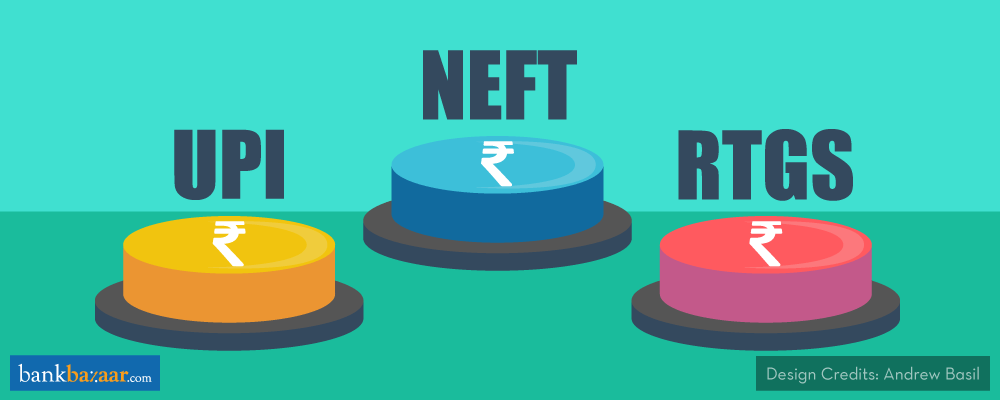
Gone are the days when funds were transferred through cheques only – the sole financial transfer instrument. These days more and more individuals are embracing the digital way for transferring money from one account to another.
And with ‘Digital India’ and the ‘Demonetisation’ move, digital transactions have become more acceptable with a high level of awareness. We now have various means of digital transfer of funds between accounts. Each one of them has their own set of clauses and come with various pros and cons.
1) NEFT
National Electronic Fund Transfer (NEFT) is the most common and widely used digital money transfer system. NEFT is not an instant transfer system and gets remitted usually in 2 – 4 hours. The money gets transferred in batches across various time slots.
The advantage of NEFT is, that it can be done either over the counter or, through net-banking or, through the mobile banking app. The beneficiary’s account number and IFSC are sufficient to initiate this type of transfer.
Banks generally charge a nominal fee ranging from Rs. 2.50 to Rs. 25 plus service taxes, depending on the value of the transfer. Some private banks, however, keep it free for their premium or privileged customers. NEFT can only be done during bank working days between 8 am to 7 pm. Any transfer request placed beyond the cut off timing or on a holiday will automatically be carried forward to the next working day. Though in general there’s no such upper limit for a NEFT, some banks have capped it at Rs. 10 lakhs per day.
Additional Reading: The NEFT Revolution
2) RTGS
Real Time Gross Settlement (RTGS) is an electronic transfer meant for instant transfer of high-value funds. The advantage here is that the transfer happens on a real-time basis within bank business hours. As per RBI rules, RTGS can be done from 9 am to 4.30 pm on weekdays and 9 am to 2 pm on working Saturdays.
This type of transfer has no upper cap, but the minimum amount should be Rs. 2 lakhs. RTGS can be done either over the counter or through net-banking or through mobile banking app and only to an RTGS enabled branch.
The transfer process is almost same as that of NEFT, however the charges are higher as compared to NEFT – up to Rs. 30 for a transfer of Rs. 2 to 5 lakhs and anything above Rs. 5 lakhs is charged at Rs. 55. So, if you are looking for an instant transfer of more than Rs. 10 lakhs, RTGS could be the best option.
3) IMPS
Immediate Payment Service (IMPS) is another instant electronic fund transfer service that can be availed by any individual holding a bank account. This inter-bank transfer is instant and real-time and can be availed round the clock – be it on a holiday or late at night. Managed by National Payments Corporation of India (NPCI), this was initiated in 2010 as a mobile payment system within 4 member banks (SBI, BOI, UBI and ICICI) which was later expanded to ATM and net banking platform with an addition of few more banks.
IMPS transfer is capped at Rs. 2 lakhs per day through net banking and the charges vary from bank to bank. A nominal charge of Rs. 5 for transfer up to Rs. 1 lakh and Rs. 15 for transfer of Rs. 1 to 2 lakhs is generally levied.
IMPS would require IFSC for net transfer and MMID (Mobile Money Identifier) code for mobile banking. IMPS through mobile doesn’t need a registered beneficiary; also, if you have net-banking, then no separate registration is required for IMPS. It can be flawlessly initiated through the net banking platform.
4) UPI
Unified Payments Interface (UPI) is a much easier way of money transfer that can be done 24/7 on a real time basis. It is an app based fund transfer that can be initiated through a smart phone using VPA (Virtual Payment Address). Being an app based transaction, there’s no need of bank account number or card details. However, mobile banking PIN is a must for every payment.
Creating an email like VPA is a must before initiating the transfer. Currently, transfer through UPI is free and has a transaction cap of Rs. 1 lakh per day.
5) *99# Service
For those who can’t do app based transactions, but still want to avail electronic fund transfers, NPCI has *99# service for them, which is based on Unstructured Supplementary Service Data (USSD) technology. The basic requirement is a GSM phone and the service can be availed 24/7.
The particular mobile number should be registered with the bank before initiating this service. SMS charges are applicable and the daily cap per day is Rs. 5,000.
With an array of fund transfer services available electronically with almost all banks all you have to do is choose the one that suits your needs.
(The writer is CEO, BankBazaar.com)